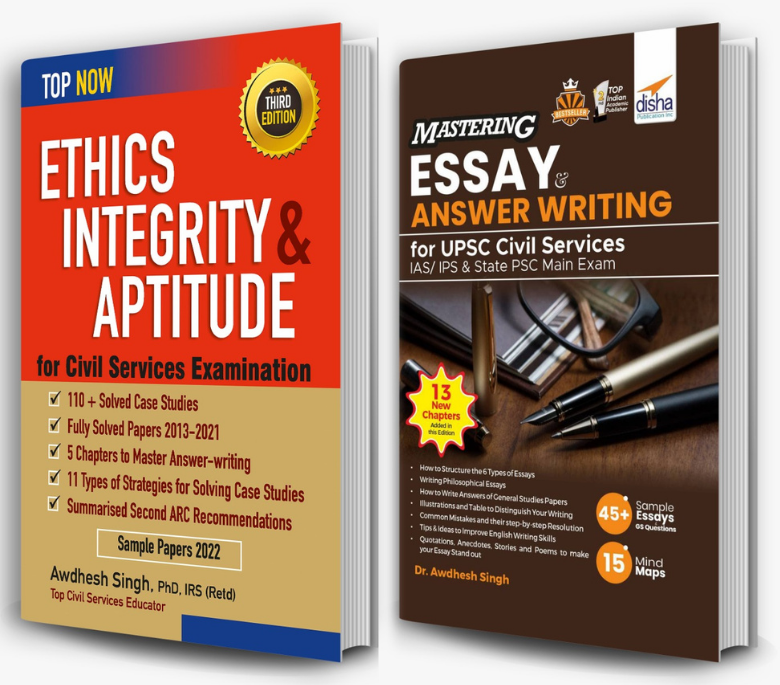Solved Ethics Papers
Topics
All
Civil Services in India (26)
Ethics, Integrity and Aptitude
» Chapters from Book (11)
» Case Studies (8)
Solved Ethics Papers
» CSE - 2013 (18)
» CSE - 2014 (19)
» CSE - 2015 (17)
» CSE - 2016 (18)
» CSE - 2017 (19)
» CSE - 2018 (19)
» CSE - 2019 (19)
» CSE - 2020 (19)
» CSE - 2021 (19)
» CSE -2022 (17)
» CSE-2023 (17)
Essay and Answer Writing
» Quotes (34)
» Moral Stories (18)
» Anecdotes (11)
» Beautiful Poems (10)
» Chapters from Book (5)
» UPSC Essays (40)
» Model Essays (38)
» Research and Studies (4)
Economics (NCERT) Notes
» Class IX (14)
» Class X (16)
» Class XI (55)
» Class XII (53)
Economics Current (51)
International Affairs (20)
Polity and Governance (61)
Misc (77)
Select Topic »

Civil Services in India (26)
Ethics, Integrity and Aptitude (-)
» Chapters from Book (11)
» Case Studies (8)
Solved Ethics Papers (-)
» CSE - 2013 (18)
» CSE - 2014 (19)
» CSE - 2015 (17)
» CSE - 2016 (18)
» CSE - 2017 (19)
» CSE - 2018 (19)
» CSE - 2019 (19)
» CSE - 2020 (19)
» CSE - 2021 (19)
» CSE -2022 (17)
» CSE-2023 (17)
Essay and Answer Writing (-)
» Quotes (34)
» Moral Stories (18)
» Anecdotes (11)
» Beautiful Poems (10)
» Chapters from Book (5)
» UPSC Essays (40)
» Model Essays (38)
» Research and Studies (4)
Economics (NCERT) Notes (-)
» Class IX (14)
» Class X (16)
» Class XI (55)
» Class XII (53)
Economics Current (51)
International Affairs (20)
Polity and Governance (61)
Misc (77)

Q12. Institutional Mechanism of Ethics in Civil Services
Q12. In recent times, there has been an increasing concern in India to develop effective civil service ethics, code of conduct, transparency measures, ethics and integrity systems and anti-corruption agencies. In view of this, there is a need being felt to focus on three specific areas, which are directly relevant to the problems of internalizing integrity and ethics in the civil services. These are as follows:
1. Anticipating specific threats to ethical standards and integrity in the civil services,
2. Strengthening the ethical competence of civil servant and
3. Developing administrative processes and practices which promote ethical values and integrity in civil services.
Suggest institutional measures to address the above three issues. (250 words) (20 marks)
Answer
Citizens, business leaders and civil society today expect that the government will establish and deliver higher standards of integrity in the civil services. This expectation is the result of better-focused media attention, public scrutiny and increasing impatience among ordinary citizens and civil society, who want to see an end to the various corrupt practices of the past.
Often the civil servants follow unethical practices to achieve results because they are judged by the results and not by the means. For example, police officers often refuse to file First Information Report (FIR), resort to third degree to extract a statement and even kill accused people in a false encounter to boost their performance.
We need to develop effective civil service ethics, code of conduct, transparency measures, and strengthen the anti-corruption agencies to improve the ethical standards of civil servants.
The following institutional measures are suggested for internalizing integrity and ethics in the civil services:
• Make laws which require civil servants to give reasons for their official decisions.
• Encourage civil servants to deal positively with corruption and unethical practice whenever they encounter it.
• ‘Whistle blower’ protection law to protect appropriate ‘public interest disclosures‘ of wrongdoing by officials;
• Ethics audits to identify risks to the integrity of the most important processes like financial management, tendering, recruitment and promotion, dismissal and discipline
• New Human Resource Management strategies to link ethical practices with performance.
• Merit based promotion and recruitment,
• Anti-discrimination protections;
• Training and development in the content and rationale of ethics codes,
• The application of ethical management principles,
• The proper use of official power and the requirements of professional responsibility,
• Effective external and internal complaint and redressal procedures. (275 words)

Looking for a One-stop Solution to prepare for ‘Ethics, Integrity, and Aptitude’ and ‘Essay and Answer Writing’ for UPSC?
Ethics, Integrity & Aptitude for Civil Services Examination
Amazon - https://amzn.to/3s1Qz7v
Flipkart - https://bit.ly/358N2uY
Mastering Essay & Answer Writing for UPSC Civil Services
Amazon - https://amzn.to/3JELE2h
Flipkart - https://bit.ly/3gVIwmv
Buy Dr. Awdhesh Singh’s books from the links below-
Ethics, Integrity & Aptitude for Civil Services Examination
Amazon - https://amzn.to/3s1Qz7v
Flipkart - https://bit.ly/358N2uY
Mastering Essay & Answer Writing for UPSC Civil Services
Amazon - https://amzn.to/3JELE2h
Flipkart - https://bit.ly/3gVIwmv
| Related Articles |
| Recent Articles |
